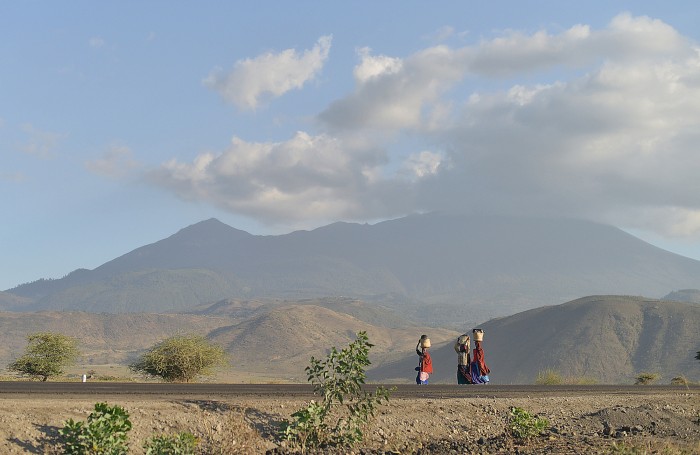Zipline Expands Drone Delivery of Medical Supplies
Less than a year after launching the world’s first national drone delivery service in Rwanda, Silicon Valley–based Zipline is expanding. Billed as the largest drone delivery service in the world, the new venture is in Tanzania, Rwanda’s neighbor to the east, and involves more than a thousand health facilities covering 10 million people in some of that country’s most remote and hard-to-reach areas.
Announced Thursday by the government of Tanzania, the partnership will entail the delivery of a range of medical products by drone from four distribution sites in three distinct areas of the country. It marks a significant diversification of Zipline’s product line. Until now, the automated logistics firm has exclusively delivered blood products for use during transfusions (see “Zipline’s Ambitious Medical Drone Delivery in Africa”).
Its Tanzania service, set to begin in early 2018, will include blood as well as emergency vaccines, medications for HIV and malaria, and emergency supplies like sutures and IV tubes. These products will be delivered by an all-new fleet of fixed-wing drones, or “zips,” capable of hauling two kilograms of cargo and traveling 160 kilometers round-trip. According to Keller Rinaudo, Zipline’s CEO, delivery costs will be roughly on par with traditional means of transport.
In Tanzania, Rinaudo believes, the company’s on-demand model can dramatically improve delivery of products—like vaccines for rabies and tetanus and anti-venom for victims of snakebites—that depend on an uninterrupted temperature-controlled supply chain, known as a cold chain. Because these products are costly to keep and only sporadically in demand, they’re rarely stocked in rural areas. But when they are needed, someone’s life is in immediate danger, and deliveries by road often arrive too late, if at all. Drones, Rinaudo says, offer the best way to deliver such treatment in time.

Zipline’s approach to more routine items, such as anti-malarials, anti-retrovirals, and other common drugs, will be slightly different. Here, the company will function as a “last line of defense” to supplement an existing supply chain. In particular, its drones will be available to respond to stock-outs—a common problem in Tanzania, as in much of the developing world, which may result from funding shortages, poor demand forecasting, or logistical bottlenecks. In a 2013 survey, the Tanzanian civil-society group Twaweza found that 41 percent of respondents were unable to obtain prescribed medications at a public health facility. Both Zipline and Tanzanian health authorities are betting that drone deliveries can efficiently fill those gaps.
Tanzania, Africa’s sixth most populous country, figured into Zipline’s plans long before Thursday’s announcement. In 2014, Rinaudo and fellow cofounder William Hetzler were both influenced by visits to the country as they looked for ways that Zipline, which was established as a more conventional robotics firm, could help save lives. Ultimately, Zipline launched in Rwanda first: Rwandan authorities were ready, and the country’s size was more manageable. (Rwanda is slightly smaller than Maryland, which means a single hub can service nearly half the country; Tanzania is bigger than Texas.) They piloted the drone-delivery model with blood, a product that expires after 42 days in storage, must be kept refrigerated, and is frequently needed on an emergency basis. Since last October, Zipline drones have made more than 1,400 flights to deliver 2,600 units of blood to 12 Rwandan health facilities. Roughly three-quarters of the deliveries there are for routine restocking, and one-quarter are in response to emergencies.
In Tanzania, Zipline’s results will be watched closely. Once the country’s first drone distribution center is in operation near the capital, Dodoma, a team composed of researchers from the University of Glasgow and Tanzania’s Ifakara Health Institute will begin to evaluate the service’s impact. In particular, they’ll be looking at facilities’ ability to administer new drone-enabled products, like the rabies vaccines, as well as the impact of airborne logistics in mitigating stock-outs.
Stock-outs are “a problem that global public health has tried to solve for like 60 years, which has proven to be intractable,” Rinaudo says. “So the idea that we finally have a solution, potentially, to solve the problem once and for all is incredibly exciting.”
Keep Reading
Most Popular
How scientists traced a mysterious covid case back to six toilets
When wastewater surveillance turns into a hunt for a single infected individual, the ethics get tricky.
The problem with plug-in hybrids? Their drivers.
Plug-in hybrids are often sold as a transition to EVs, but new data from Europe shows we’re still underestimating the emissions they produce.
What’s next for generative video
OpenAI's Sora has raised the bar for AI moviemaking. Here are four things to bear in mind as we wrap our heads around what's coming.
Stay connected
Get the latest updates from
MIT Technology Review
Discover special offers, top stories, upcoming events, and more.